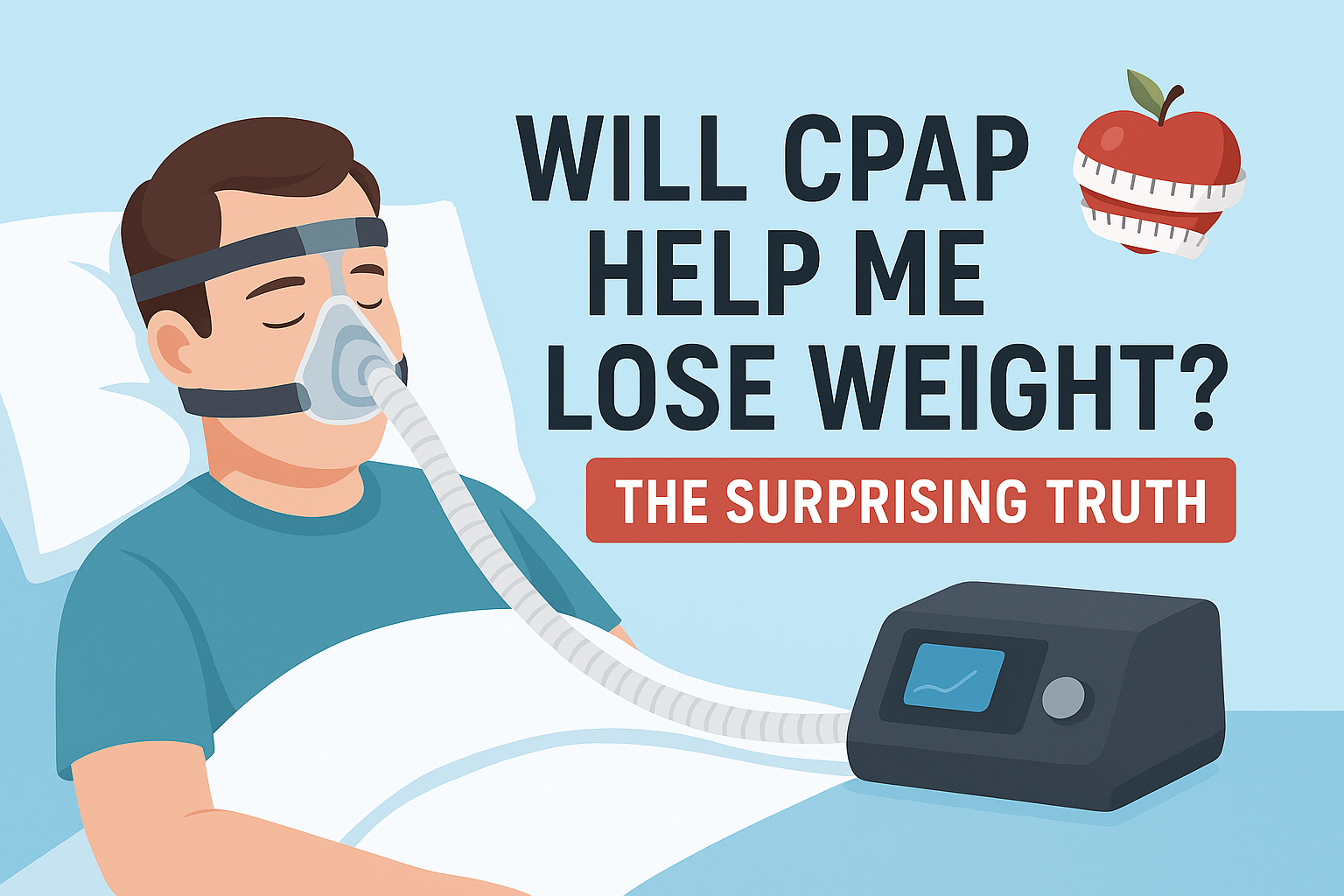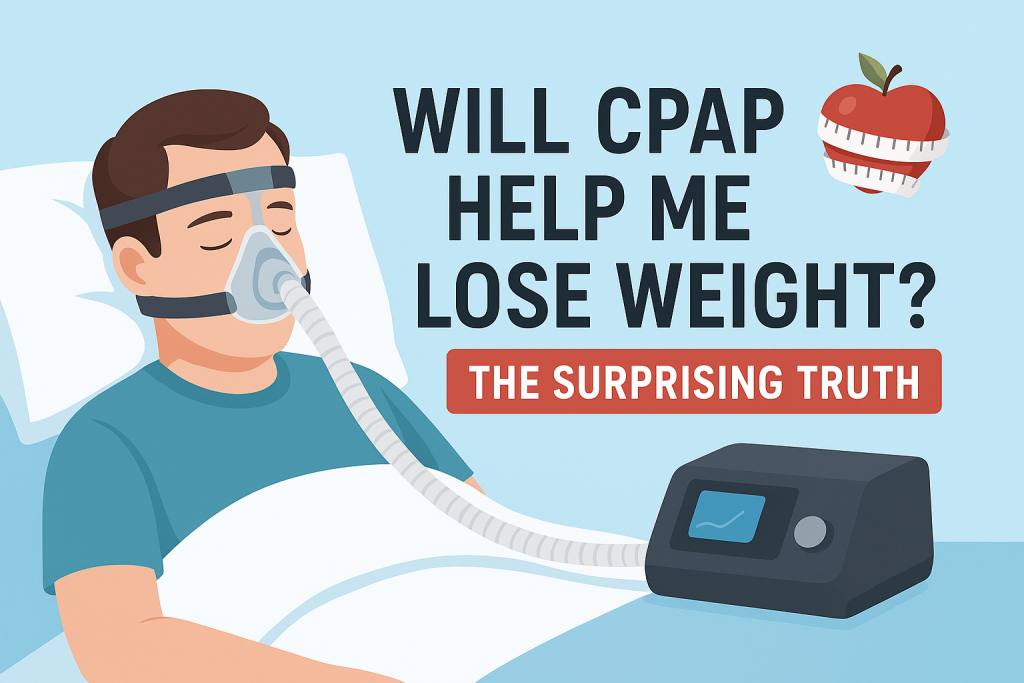Will CPAP Help Me Lose Weight? The Surprising Truth


Meta Description: Wondering if CPAP can help you lose weight? Discover what science says about CPAP therapy, weight gain, and how beginners can combine CPAP with lifestyle changes for better results.
Introduction
If you’ve recently started using a CPAP machine for sleep apnea, you may be wondering: Will it also help me lose weight? Many beginners hope CPAP therapy will double as a weight-loss tool. The truth is more complicated. While CPAP improves sleep and energy, research shows it doesn’t directly cause weight loss — and in some cases, it may even lead to small weight gain.
Let’s explore what the science says, why this happens, and how you can make CPAP part of a healthier lifestyle.
What Is CPAP and Why Is It Prescribed?
CPAP stands for Continuous Positive Airway Pressure. It’s the most common treatment for obstructive sleep apnea (OSA), a condition where your airway repeatedly closes during sleep, causing you to stop breathing.
By gently pushing air into your airway, CPAP keeps it open so you can breathe normally and get better-quality rest. You can learn more about how CPAP works from the Sleep Foundation.
Does CPAP Help You Lose Weight?
The short answer: CPAP alone usually does not lead to weight loss.
In fact, studies show mixed results:
- Some people experience no change.
- Some maintain their weight.
- Others may gain a few pounds.
A clinical review published in the Journal of Clinical Sleep Medicine even found that CPAP therapy is often linked with slight weight gain rather than weight loss.
So if your goal is shedding pounds, CPAP shouldn’t be seen as a standalone solution.
Why CPAP Might Lead to Weight Gain in Some Users
You might be surprised to hear that CPAP could actually make weight loss harder for some people. Here’s why:
- Metabolism slows down: Better sleep may reduce how many calories your body burns at rest. (Sleep Foundation)
- Hormonal shifts: Appetite-regulating hormones like leptin and ghrelin can change after CPAP therapy, affecting hunger cues. (PubMed Central)
- Fluid retention: Some users experience mild fluid buildup.
- Increased lean mass: Weight gain may reflect more muscle mass, not just fat.
How CPAP Can Support Weight Loss Efforts
Here’s the good news: while CPAP won’t melt pounds away on its own, it can make lifestyle changes easier.
- Better sleep = more energy: You’ll feel less fatigued and more motivated to exercise.
- Improved recovery: Quality sleep supports muscle repair and fat metabolism.
- Consistency matters: Studies like one from the University of Arkansas for Medical Sciences show that patients using CPAP alongside diet and exercise lost more weight than those who didn’t use CPAP.
Actionable Tips for Beginners
If you want to lose weight while using CPAP:
- Don’t rely on CPAP alone – think of it as a support tool, not a diet plan.
- Adopt a balanced diet – focus on whole foods, lean proteins, fruits, and vegetables. (CDC Weight Management Guide)
- Stay active – aim for at least 150 minutes of moderate activity each week.
- Track progress – keep a journal of your sleep quality, energy levels, and weight changes.
- Work with your doctor – regular check-ins will help adjust your therapy and goals.
CPAP and Weight Loss: Myth vs. Fact (Quick Recap)
- Myth: CPAP makes you lose weight automatically.
- Fact: CPAP alone may lead to weight gain, but it improves your energy and sleep quality.
- Truth: CPAP helps most when combined with healthy eating and exercise.
Conclusion
So, will CPAP help you lose weight? By itself, probably not. But when paired with lifestyle changes, CPAP can be a powerful ally in improving energy, consistency, and overall health — all of which make weight loss more achievable.
FAQs
1. Can CPAP make me gain weight?
Yes, some studies show CPAP may cause slight weight gain due to slower metabolism, hormonal changes, or fluid retention.
2. How long does it take to see changes with CPAP?
You may notice better sleep and energy within days or weeks, but weight-related changes depend on your lifestyle.
3. Should I stop CPAP if I gain weight?
No. CPAP improves sleep quality and reduces health risks from sleep apnea. Always consult your doctor before making changes.
4. Is weight loss easier if I treat sleep apnea?
Yes. Treating sleep apnea gives you more energy and helps regulate appetite, making weight-loss strategies more effective.
















